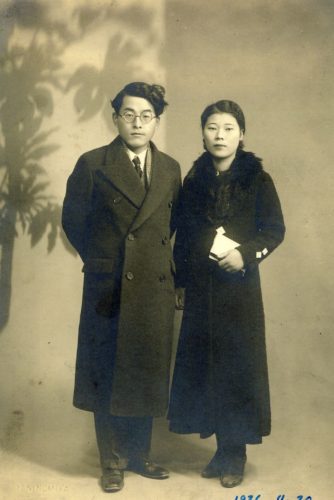
A small story for a Friday, one that recaptures a bit, at least for me, that spirit of the early internet. All about connections and discovery and serendipity, or at least that is how I mythologize it.
I have written before about my wife’s family history, which I see as somewhat emblematic of the Korean 20th century and diaspora in general. This was a difficult century for many, but Korea had a particularly rough stretch. Beginning as an ancient kingdom, it lost its independence to the Japanese in 1910, toiled for quite some time and achieved independence when Japan surrendered at the end of World War II. Russia occupied the area north of the 38th Parallel, the US south of the Parallel. Both constructed separate governments in their respective sections, elections were held in 1948 and the country was effectively and thoroughly split in half. It had never been so before. The Korean War brought widespread devastation across the peninsula. Families were split, brothers fought against brothers, tragedy loomed everywhere. The diaspora carried millions of Koreans around the globe, building homes in the Americas, in the Central Asian steppes, deep into Russia and beyond.
Artistically emblematic of that time is the novel Three Generations by Yom Sang-Seop (염상섭), first published in serial form in 1931. It chronicles the plight of a Korean family under the Japanese colonial regime (the colonial regime spanned approximately 1910-1945). It details a family struggling between the duties of tradition and the pulls of modernity. The three generations are the grandfather, Cho Ûi-gwan, a traditionally-minded landowner who buys himself a lineage genealogy to become a yangban (Korean nobleman); the father Cho Sang-hun, who has accepted much of modernity but still lives by wasting the family fortune; and the son Cho Tôk-ki, who is caught in the discord between the father and grandfather. At the beginning of the novel, Cho Tôk-ki is returning home from studying abroad in Japan. Strangers in their own land, adrift, and searching for identity. I wrote about it in a paper. It really is a beautiful work.
My wife’s grandparents, Lee Hae Nam (이해남) and Seo Bok Kyoung (서복경), met at Hiroshima University in Japan in the 1930s, a city that at the time was known for its universities. They met there partly because it was an avenue open to them as Koreans living under Japanese rule (very few opportunities for university education were actually open to Koreans in Korea itself). They fell in love, married, moved to Pyongyang, then to Seoul. He became a professor of History at Hanyang University (한양대학교) in Seoul for many years, but eventually fell on the wrong side of Park Chung Hee‘s (박정희) wrath (almost everyone did at some point). They left for Canada, settling in Montreal and St. Catharines. Hiroshima, Pyongyang, Seoul, Montreal, St. Catharines. I put a few of their older photos, including some from their time in Hiroshima, on Flickr. And the other day, I received this email:
I discovered by chance your Flicker account and found the nice photo of your wife’s grandparents.I work for an independent publishing house based in Switzerland: we publish literature in French, and we actually work on a translation of Three Generations by Yom Sang-Seop, a classic of Korean literature. In order to illustrate our book cover we would like to use the photo in a montage of several others.
A minor event to be sure, but a generation of French readers will know this novel, a classic of the twentieth century, at least in some small way through the frame of my wife’s grandparents. Their figures will project into the minds of at least a reader or two as they work through the characters’s narrative arcs. Two stories of the Korean diaspora connected, ever so whimsically, through a photograph posted online. This one, in fact.


French editions of Yom Sang-Seop, photographs from Korean diaspora (and of grandparents of @jenseoul), and discover… https://t.co/Uem8KXLn1s
RT @mseangallagher: French editions of Yom Sang-Seop, photographs from Korean diaspora (and of grandparents of @jenseoul), and discovery ht…
French editions of Yom Sang-Seop (염상섭) and photographs from the Korean diaspora. https://t.co/v8u8FGCh45 https://t.co/oolHlxja8s
French editions of Yom Sang-Seop, photographs from the Korean diaspora, and discovery https://t.co/9RDUzWRVWZ… https://t.co/HkzUvDrzF0
French editions of Yom Sang-Seop, photographs from the Korean diaspora, and discovery https://t.co/4nZqfbvnzd… https://t.co/cn3AOR4pvO
French editions of Yom Sang-Seop, photographs from the Korean diaspora, and discovery https://t.co/KaphHO98fp #Korea https://t.co/vgNOn7ja3x